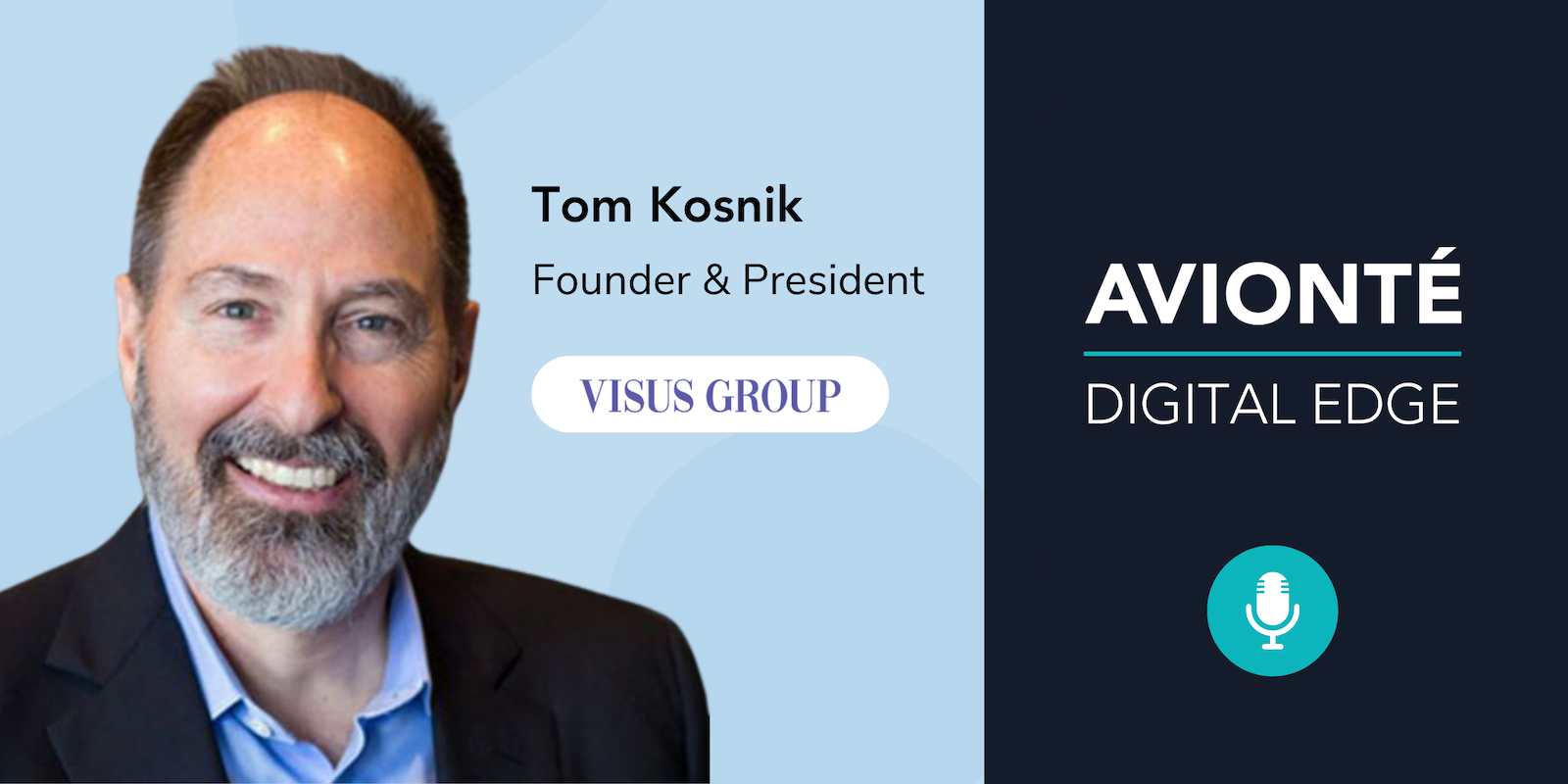What strategies can staffing leaders use to effectively engage with this new generation of workers? And how can we provide them with the necessary support to ensure their success as the upcoming leaders in this field? To help shed light on these questions, Christopher Ryan, Chief Marketing & Strategy Officer at Avionté, sits down with Tom Kosnik, President of Visus Group, LLC.
Continue readingStaffing Exclusive
Get ready to explore the shifting dynamics of staffing in today's job market. Tom's insights offer a roadmap for companies to adapt, thrive, and excel.
Continue readingAll Lead Generation Tactics Are Not Equal
by Visus Group Partner Jay Mattern, CEO of TerraFirma Marketing
All Lead Generation Tactics Are Not Equal
If you are utilizing outbound marketing to generate leads, how can you stand out from the crowd and generate optimal results? And by results, I mean getting readers/subscribers to do more than just open an email. Here are seven tips that will help you convert more leads into sales.
1.Stay True to Your Brand
Too often, email campaigns are generic and fail to convey the solicitor’s branded message. While it’s important to tailor your message to the reader and address their needs, your brand still needs to come through loud and clear. Even if your email is short and to the point, it should always be created in your brand voice and reflect your messaging strategy.
2. Learn how to get and direct attention.
The email’s subject line is certainly important but getting them to go beyond that will require a purposeful design and compelling content. How can you use design to direct the reader’s attention? By using the elements of motion, size, color, and positioning, you can subtly yell at the reader — “HEY, LOOK AT ME!” Here are some specific ideas:
- Placing an element higher in the email is more recognizable than a lower one.
- An element that is in contrast with its surroundings is more recognizable than one which blends in.
- A larger element is more recognizable than one that is smaller.
- Bold and/or italicized font stands out when used sparingly.
3. Never forget that conversion is the primary goal.
You should always be asking yourself “what do I want the audience to do?” Ideally, you want them to respond to your Call to Action – to click on the CTA button. That’s what we mean by conversion. The ultimate end of your sales and recruiting process is undoubtedly more involved, but the immediate objective of an email or ad is always to motivate the reader to want to learn more. You need to open that door.
4. Triple-check everything.
Have you ever clicked on a CTA (converted!) and actually wound up on an “Error 404 – the requested URL was not found?” Or the click actually did nothing. It is imperative that you check all of your links to make sure they all work as promised. This is your first opportunity to deliver on something you promised, and a poor impression here takes you out of the running.
5. Make use of urgency.
It’s well known that we tend to want what we can’t have. When something is rare, exclusive, or limited, it immediately makes it more desirable and more in demand. Use this same approach in your email marketing efforts. Limit your offer. Make it clear that immediate action is necessary, whether it’s due to a timeline you set or a seasonal/business cycle. Convey a sense of urgency.
6. Get to the point.
The best lead generation emails are written understanding that the reader’s time is scarce and you’re competing for their attention. No one will take the time to search for your message. It’s your job to package and present it.
- Use bullet points to highlight key ideas. This will help the important takeaways easily stand out from the rest of the text.
- Strategically utilize imagery (a picture is still worth 1,000 words).
- Most important is a clear and inviting Call to Action. It should be just that – a “call” to the reader to do something.
7. Use landing pages.
To get the most from leads you generate, you should use a unique landing page designed specifically to convert the lead to the next step and move them into the lead funnel. A well-designed landing page will prevent the lead from being distracted by other messages or information that reside on your website and will focus them specifically on what the next step is.
Given the significant shift towards digital marketing and automated marketing solutions, getting a message through to a prospect or candidate is becoming increasingly more difficult. Your message must truly stand out and present itself uniquely in order to successfully engage the prospect. With deliberate focus and attention, you can optimize your email marketing results and more easily turn leads into results. And that is the ultimate goal.
How to find the right legal partner for your staffing or recruitment firm
As a business owner, it is common practice to eventually need to seek outside legal counsel or hire a law firm to represent your organization. The staffing and recruitment industry is no different. In fact, I might argue based on my nearly 30 years in the industry, that finding the right legal fit for your business is even more important given all the nuances with regards to employment law…after all, we are in the ‘people’ business. After a couple of recent experiences with my clients, I thought it would be timely to offer some advice to avoid common pitfalls when hiring legal representation.
Let’s start with a few examples where my clients were given legal advice from attorneys that did not have experience in the staffing industry.
Case Study #1
An owner of a staffing business had a solid B player that took a job with a competitor. The business owner’s attorney advised to take legal action against the employee and the competitor. I suggested going to the competitor and asking for a fee to buyout the non-compete. The non-solicitation could remain but make some money on a buyout. The pursuant owner of the staffing business spent more than $100k and lost on all counts. I don’t know if this is true, but I heard that 9 out 10 non-compete litigations go in favor of the employee. Very difficult to stop someone from making a living as a recruiter or sales executive.
Case Study #2
An owner of a staffing firm generating $8 million in annual revenue was selling the firm. The owner had a very solid offer from a very ethical staffing business that was north of $100 million in annual revenue. The structure of the deal was 70% cash at closing and 30% in an earnout. The person that was selling had an attorney that had never assisted in the sale of a staffing firm. The attorney was adamant about a “personal guarantee” from the owner of the buying firm, a staffing firm north of $100 million in annual revenue, let me remind you. There are so many other ways to guarantee such a transaction. The deal went sideways. (and then what)? Perhaps we come up with it went sideways and the buyers pulled their offer?
Paying for outside support is not usually the top choice for any business owner, however, the cost avoidance when hiring an expert, is worth it in the long run and can actually save you money in many cases. I have seen many smaller firms where they will have their CFO or HR resource review legal matters, however you have to ask yourself depending on the matter, is the risk worth it? When matters get more serious and with ever changing laws in the employment world, it is smart to engage legal support. When hiring an attorney or contracting for legal services here are a few things to consider in order to find the right fit for your business.
- Find an attorney and/or law firm that has staffing industry experience. An attorney and/or law firm that has staffing industry experience is extremely valuable. This is likely the most important criteria to use when choosing an attorney. Businesspeople not from the staffing industry look at the staffing industry as a “simple” business. Nothing could be farther from the truth. There are contracts and liabilities with buyers of staffing services. Be aware of the liability buyers attempt to push down to staffing firms. There are contracts between contractors and temporary employees as well as many legal requirements that need to be honored. Then there are internal employees with non-competes and non-solicitation agreements and compensation programs for senior level employees.
- Trust your intuition. Years ago, a client of mine taught me that you must sense that your attorney is acting in your best interest. My client told me that it is not anything logical, but rather it was more of an intuitive sense otherwise known as gut instinct. He said, “The first time you start thinking your attorney is padding the hours, then that is a sign that something is not right.” Your attorney and/or law firm needs to be a trusted advisor in which you have total and complete trust.
- One size does not fit all. Attorneys will specialize in areas of expertise such as workers compensation, mergers and acquisitions, human resources, general business, property, etc. Many small staffing firms will hire an attorney that is a “friend of a friend”. This is potentially a big mistake. Even a small staffing firm will likely need access to a handful of attorneys that specialize in various areas of specialty. One size does not fit all when it comes to legal advice. And reliably, high quality and professional legal advice is worth its weight in gold.
- The American Staffing Association (ASA) has your back. For all those that own and operate staffing firms in the United States, a quick question or inquiry to the attorneys at ASA can go a long way in getting proper guidance. I am a long-time member of the ASA and the attorneys on their staff have provided tons of high-quality advice to the Visus Group clients over the years. In addition, when I reach out to the ASA attorneys, I consistently get a professional and prompt response. Don’t forget the great resources available to you at your fingertips.
At the Visus Group we have a few alliance relationships with attorneys that have multiple years of staffing industry experience. If this is an area of concern for you or your staffing firm, feel free to reach out to us. We work with many staffing firms through our RoundTable programs who spend time addressing and discussing legal issues they are facing as well as use our program to share their networks with our members.
Another year, another set of problems? Or can we really grow?
Happy 2021! As we move into this new year, here are a few predictions (or maybe not predictions as much as obvious statements!) about where we are headed as an industry. Let’s get started. The staffing industry is going to experience double digit growth in 2021. Borrowing money is not only going to be accessible, but interest rates are going to remain low. The rollout of the COVID-19 vaccine will increase consumer confidence and hopefully will allow us to open more doors to dining, schools, and back to the office.
These are all great signs for us in the staffing industry. But, how do we take advantage of these opportunities? What key initiatives should we be focusing on to put us on a path for growth? And finally, how do we avoid our past mistakes we’ve made as it relates to our business planning? Trust me, these are common questions all staffing owners and leaders ask themselves each year. Here are my top recommendations to avoid perennial pitfalls:
Refine Your Hiring Methodology to a Science
Many staffing firms struggle hiring new employees. Staffing firms that succeed in this area execute on several components:
- First, they have a proven hiring process, and they DO NOT vary from this process.
- Second, they have a very strict hiring profile. You guessed it, they don’t vary from this hiring profile.
- Third, they use a valid and reliable personality survey tool.
- Fourth, they know how to interview or they should, after all, they are a staffing company! There is an art to networking and building businesses, there is a science to interviewing and the best staffing firms have become experts at this process for their internal hiring.
Faulty hires cost staffing firms millions in lost revenue through poor culture fits or lack of production. Refine your hiring methodology to a science to take advantage of the pending growth opportunity.
Understand Your Culture
It is not uncommon to see 20% of a staffing firm’s sales reps generating 80% of the revenue. What if a staffing business owner or manager can figure out how to hire “A” players? You can! This is where cultural awareness and matching come into play. Your company has a very specific “culture”. For example, collaborative versus independent, or entrepreneurial versus highly structured, or authoritative decision making versus collaborative decision making. These are just a few cultural preferences. There is a way to understand your firm’s cultural preferences and then discover the cultural preferences of candidates your firm is recruiting and interviewing. This is the secret sauce to hiring “A” players that fit and thrive in your organization. But remember, Sticking to a great hiring process and a culture match is one thing – but also ensuring we have a rock solid training program in place that is scalable and knows it works is critical. As leaders / managers of an organization, we have to ‘create the opening’ and provide all the necessary resources to set our people up for success. That all said, getting them in the door is one thing, ensuring we set them on a proper development path is critical as well versus the ‘sink or swim’ mentality.
Don’t Get Crazy with Remote Work
There is a lot of talk in the industry about staffing firms retaining a 80% virtual business model. The data is starting to come in. Sales teams that are working in an office environment where they can easily collaborate are more successful over sales teams that are working remotely meeting on zoom a couple of times of week. Ethan Mollick, Associate Professor at Wharton, recently conducted a study on the productivity of remote working versus in the office working. Mollick states, “A downside of remote work is that we can’t casually learn from each other the way we can in an office. The effects of such interactions are huge: Lunch meetings between two salespeople where they discussed sales approach boosted revenues for both by 24% four months after”!
The fact of the matter is that most people cannot reach their full potential working remotely. Throughout this COVID-19 pandemic, it has been easier working from home with restaurants and bars and a lot of other venues closed. Once the economy really opens, we are going to see how effective the work from home model works. The organizational behaviorists suggest the 80/20 rule. 80% working from the office and 20% working remote.
Double Down on Your Sales Strategy
This is a big one for staffing firms that will succeed as the economy comes back. You can hire great employees, but if your sales strategy is lacking or non-existent the probability of success will decrease radically. What is included in a strong well-functioning sales strategy? A well-defined ideal client profile for one. A client profile that not only outlines the demographic characteristics of a great client, but the psychographics and geographic characteristics as well. Account planning that has names of decision makers, total contingent spend, percentage your firm has, action steps and such that is the tactical steps your staffing firms needs to execute upon to obtain high quality business and develop sustainable relationships.
As mentioned, we just outlined a few key initiatives to focus on in this year to take advantage of the projected industry growth, but there are many more. The Visus Group has become the Resource Hub to the staffing industry from an organizational development and growth strategy perspective. Whether it is business planning, financial planning and analysis, compensation analysis and design, sales execution, leadership development and much more the Visus Group is here to help. And our Presidents RoundTable has become a fantastic resource for many business owners in the staffing industry. At the end of the day, success is all about forging ahead, not looking back.
Check us out at www.visusgroup.com. I wish you all the best of success in 2021.
Compensation on Steroids: The Top 3 Sales Levers that Need to Pop in a Strong Commission Plan
Given everything that has happened in 2020, the COVID-19 pandemic may have flipped your business upside down, but one thing is certain – you need a simple and compelling commission plan that incentivizes your employees to produce in a way that grows with the business. The considerations that need to be addressed along with trying to account for continued uncertainty with the pandemic is still top of mind. This time of year provides a great opportunity to assess and address your top sales driver – your commission plan – as you look to grow or recapture some of your lost business.
A quick reminder…your staffing firm is a sales organization. And because you are a sales organization, your sales commission structure is critical to your success. Compelling, engaging, motivating commission plans are not easy to craft. Such plans really need, first and foremost, to fit into a financial model. And the best plans utilize multiple sales levers to account for the ever-changing environment. When I speak with clients, here are my top areas to consider when creating a competitive commission structure:
Salaries: No secret here that salaries have crept up over the past few years. For years the staffing industry has enjoyed very reasonable base salary levels with aggressive commissions. It is safe to say that these days are over. New graduates coming out of college are straddled with debt. Their appetite for low base salary and high commission jobs is close to non-existent. Two quick scenarios that I would like to outline that I’ve seen staffing companies dealing with throughout the years:
-
- Step-down salary management – Think about building a plan where the salary decreases as commissions increase in the first year of employment. For example, the target salary may be 40K. But to attract promising reps and recruiters the company starts an employee out at a 60K salary level. After three months, the salary decreases 2K a month for the next nine months.
- Performance management – A Manager should have a sense after 3 months if a sales rep or a recruiter is not going to work out. After 6 months, the manager has the performance data. Getting this decision down protects the financial investment. For example, the company offers an employee a 50K salary, add 20% for taxes and benefits and the real cost is 60K. An employee that does not make the cut in 6 months, is in this example, only a 30K investment.
Gross Profit Production: Clearly, for a staffing firm, gross profit production is king. This should be the central in any commission structure for a staffing firm. Several thoughts here to consider:
One, think about a threshold. Namely, the employee must generate 5K of gross profit prior to receiving commissions.
Two, have a graduated scale. For example, 2% for the first 10K of gross profit generated for the month, 4% for the next 10K of gross profit generated, 6% for the next 10K of gross profit generated, and so on. This component of a commission structure rewards and motivates getting into the upper buckets of a commission plan.
Three, the closer the reward is to the behavior the stronger the reward will be. Paying a gross profit production commission on a quarterly basis rather than a monthly basis is a mistake.
Four, never, ever, have a retroactive component. For example, once an employee hits 50K in gross profit production they receive the higher percentage commission reward on the entire 50K of gross profit.
Five, add an individual monthly component specific to the rep or recruiter. For example, a company that hires a new rep, just starting out, needing accounts, pay a 2K bonus for hitting a quarterly new account target. With this component, a staffing firm can individualize its commission structure. There are so many more ideas for this component of the commission structure.
Performance Drivers: The achilles heel of commission structures in the staffing industry is that so few firms reward performance drivers. Any staffing firm worth its salt knows the three to five activities that drive business, gross profit growth and revenue growth. These are called “leading” indicators. Gross profit, by the way, is a “lagging” indicator. The goal here is to have some component of the commission plan that rewards the few things that drive growth. For sales reps, these are client visits, attending networking events, and following up on job orders and leads from recruiters. For recruiters, it is submittals into hiring managers, candidate interviews and delivering leads to the sales team. A performance quota component of the commission plan rewards an employee for hitting certain targets on a monthly basis. For example, a staffing firm could have 2K a month activity bonus. If a rep hits 100% of their target they receive 100% of the 2K. If the rep hits 90% they receive 90% of the 2K. If the rep hits 80% they receive 80% of 2K, and so on. Anything below 70% is zero.
As in any sales plan, these ideas are just the tip of the iceberg. There are so many factors to consider in developing a strong commission plan for keeping your sales team engaged and motivated to win. Developing the right one can be a daunting task as you look at every facet of your business during your budgeting season.
We’ve been helping staffing companies solve these types of challenges for over 25 years. That’s why we’re your hub for any compensation plan discussions you think you will need during this time. Contact us and let’s connect. We’ve been working with staffing and sales leaders for decades developing the right plans to grow their firm.
At the end of the day, it’s about growth and the winning commission plans utilize a combination of best practices, multiple sales levers, and timely rewards to instill the behavior you are seeking that will lead to your firm’s success. One last thought, keep your plans as simple and scalable as possible!






